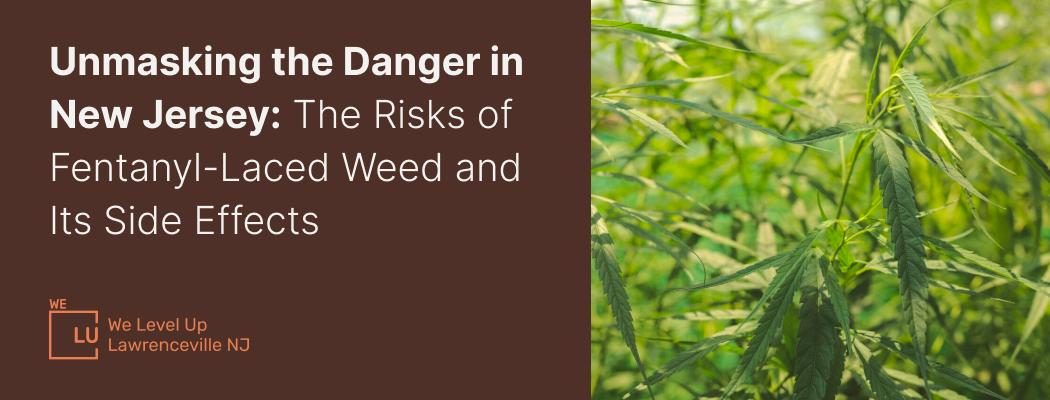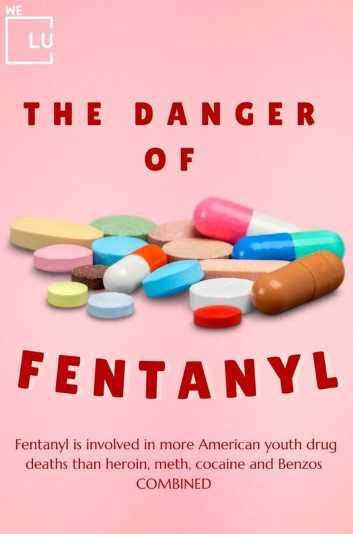Can weed be laced with fentanyl? The short answer is – Yes, but it’s not very common. Even so, fentanyl-laced weed is a growing worry in New Jersey. Fentanyl is very strong and can be deadly, even in small amounts. That’s why we need to talk about this problem and spread awareness. We are here to tell you about the risks of weed laced with fentanyl, its side effects, and the importance of seeking help and drug rehab NJ treatment centers provide.
Skip to:
The impact of fentanyl
Fentanyl is an extremely strong painkiller that belongs to a group of drugs known as opioids. It’s much stronger than a lot of the other opioids— fentanyl is actually about 50 to 100 times more potent than morphine. These levels of potency are the reasons why this drug a leading cause of drug overdoses.

The rising threat in New Jersey
There were 56,516 overdose deaths across the United States caused by synthetic opioids like fentanyl in 2020. By the 12-month period ending in October 2021, overdose deaths had increased to over 105,000, with fentanyl implicated in 69,000 of these fatalities.
In New Jersey, fentanyl was found in just 42 of 1,223 drug overdose deaths in 2012. In 2019, the number of fentanyl overdose deaths increased to 2,248, which made up 75 percent of the drug fatalities in the state.
Get Help. Get Better. Get Your Life Back.
Searching for Accredited Drug & Alcohol Rehab Centers Near You? Or Mental Health Support?
Even if you have failed previously, relapsed, or are in a difficult crisis, we stand ready to support you. Our trusted behavioral health specialists will not give up on you. Call us when you feel ready or want someone to speak to about therapy alternatives to change your life. Even if we cannot assist you, we will lead you wherever you can get support. There is no obligation. Call our hotline today.
FREE Addiction Hotline – Call 24/7Why is weed laced with fentanyl?
Fentanyl-laced weed sounds almost counterintuitive. Fentanyl is more expensive than cannabis, being a synthetic opioid. This makes no sense economically. However, one reason dealers mix fentanyl with weed is to make the effects of marijuana stronger and create a more profound experience. This makes the product more appealing to some consumers, even though it is more dangerous.
Another motive behind fentanyl laced weed is ensuring dependancy. Since fentanyl is highly addictive, it makes you dependent. This creates a steady demand, which is profitable for dealers because if you get addicted to the effects of fentanyl-laced weed, you will more likely return and buy the product more times. However, weed laced with fentanyl is much more dangerous for your health.
Myths vs. facts – lacing weed with fentanyl
When talking about weed laced with fentanyl in New Jersey, it’s important to know what’s true and what’s not. You might hear stories online or in the news suggesting that finding weed mixed with fentanyl is common. These stories can make the situation seem worse than it is. Yes, finding any drug mixed with something else is serious. But we need to rely on solid facts and research to understand how often this really happens.
Research and expert opinions show that weed laced with fentanyl is pretty rare. People who use weed most likely won’t come across it laced with fentanyl. This doesn’t mean we shouldn’t be careful. Fentanyl is mainly found in drugs like heroin or fake pills, not so much in weed.
Being careful Is still important
Even though it’s rare, the danger of fentanyl-laced weed is real. Fentanyl is very strong, and a tiny bit can kill. Experts and health people say everyone using drugs should know about this risk. If you’re going to use drugs, using a test kit to check for fentanyl can save lives. It’s better to be safe than sorry.
There’s a lot of fear about fentanyl-laced weed, but the big picture tells us it’s not a common problem. Still, it’s good to be aware and take steps to protect yourself. Learning from reliable sources and being smart about drug use is the best way to stay safe. Let’s focus on the facts and keep each other informed and cautious.

Get Your Life Back
Find Hope & Recovery. Get Safe Comfortable Detox, Addiction Rehab & Mental Health Dual Diagnosis High-Quality Care at the We Level Up Treatment Centers Network.
Hotline (877) 378-4154How to tell if weed is laced with fentanyl
It can save lives to know if marijuana is laced with fentanyl. Even in modest doses, the potent opioid fentanyl can be extremely harmful. If cannabis is combined with fentanyl, it can be difficult to identify merely by looking. What then does marijuana that has been laced with fentanyl look like? Fentanyl, on the other hand, is a white powder that is frequently used in such minute amounts that you may not even notice it.
You should be aware of unexpectedly strong effects:
- Intensity: Fentanyl is incredibly potent. We’re talking about a substance that’s 50 to 100 times stronger than morphine. So, if your weed suddenly feels way more intense than anything you’ve experienced before, it might not just be strong weed; it could have fentanyl in it.
- Speed: The effects of fentanyl kick in fast. If you notice the high hitting you quicker and harder than usual, that’s a sign to be wary. Weed normally has a gradual onset, but fentanyl-laced products can change the game, bringing on effects unexpectedly quickly.
- Type of high: Fentanyl affects the body differently than cannabis. Weed typically relaxes you, might make you giggly, or give you the munchies. But if you feel extreme drowsiness, respiratory depression (meaning, it’s hard to breathe), or even a type of euphoria that doesn’t feel like your usual weed high, these are warning signs.
Side effects of fentanyl laced weed
Using weed mixed with fentanyl is dangerous. It includes immediate and long-term health risks.
Immediate health risks
When weed is laced with fentanyl, the immediate health risks are serious and can escalate quickly. They include:
- Trouble breathing
- Extreme drowsiness
- Confusion
- Unconsciousness

Trouble breathing
You may struggle for air, feeling like you’re not getting enough no matter how hard you try. This isn’t just being out of breath; it’s a persistent, frightening sensation that you can’t take in enough oxygen.
Your body needs oxygen to function. When your breathing slows down or becomes too shallow, vital organs like your brain and heart may not get the oxygen they need to work properly. This can lead to serious complications, including brain damage or heart failure.
Extreme drowsiness
Imagine the sleepiest you’ve ever felt. Now, multiply it. You might feel overwhelmingly sleepy to the point of not being able to keep your eyes open, even if you try. It’s not just feeling tired; it’s an uncontrollable urge to sleep.
This level of drowsiness can be a precursor to losing consciousness. If you’re unable to wake up, it becomes impossible to seek help on your own. In a state of deep unconsciousness, you’re also at risk of choking or experiencing respiratory failure.
Comfortable Facilities & Amenities
High-Quality Addiction & Mental Health Rehabilitation Treatment
Rehab Centers TourRenowned Addiction Centers. Serene Private Facilities. Inpatient rehab programs vary.
Addiction Helpline (877) 378-4154Proven recovery success experience, backed by a Team w/ History of:
15+
Years of Unified Experience
100s
5-Star Reviews Across Our Centers
10K
Recovery Success Stories Across Our Network
- Low Patient to Therapist Ratio
- Onsite Medical Detox Center
- Comprehensive Dual-Diagnosis Treatment
- Complimentary Family & Alumni Programs
- Coaching, Recovery & Personal Development Events
Confusion
Things may seem foggy or mixed up. You might have trouble remembering where you are, what time it is, or what you are doing. Decisions become hard to make, and understanding what’s happening around you feels impossible.
Confusion can prevent you from realizing you’re in danger, making it less likely that you’ll seek help. It also makes it difficult for you to communicate effectively with others who might be able to assist.
Unconsciousness
You could suddenly pass out, unable to respond to your surroundings or wake up. This isn’t falling asleep. It’s a loss of consciousness that you have no control over.
Unconsciousness is a clear sign of a life-threatening overdose. It means your body is unable to cope with the effects of the drug. While unconscious, you can’t ask for help, and your body may not manage vital functions properly, like breathing.
Long-term health risks
The long-term health implications of using weed laced with fentanyl could be far-reaching. Fentanyl’s highly addictive nature means that even infrequent use when mixed with weed, can quickly lead to dependency.
Here’s a deeper look into the long-term effects of fentanyl laced weed:
- Addiction and dependency
- Mental health issues
- Physical health problems
- Lifestyle and social impact

Addiction and dependency
Fentanyl’s potency means that addiction can develop quickly, even after a short period of use. The body and brain quickly become accustomed to the drug’s presence, craving more to achieve the same effects. Also, overcoming addiction to fentanyl is challenging. Withdrawal symptoms can be severe, and the psychological grip of addiction can make it hard to quit without professional help.
Mental health issues
Regular use of fentanyl can lead to noticeable changes in how the brain functions, affecting memory, decision-making, and the ability to learn. Furthermore, prolonged fentanyl use is linked to an increased risk of depression and anxiety disorders. The chemical imbalance caused by the drug can make it difficult to find joy in activities you used to love.
Physical health problems
Fentanyl can put a strain on your heart, leading to an increased risk of heart disease, heart attacks, and other cardiovascular issues.
Long-term opioid use affects breathing. Over time, it can lead to chronic respiratory problems or worsen pre-existing conditions. There’s evidence to suggest that fentanyl can weaken the immune system, making you more susceptible to infections and illnesses.
Lifestyle and social impact
Addiction can strain or destroy personal relationships, leading to isolation and a breakdown in social support networks. The compulsive need to use can disrupt your ability to work, leading to job loss and financial difficulties.
World-class, Accredited, 5-Star Reviewed, Effective Addiction & Mental Health Programs. Complete Behavioral Health Inpatient Rehab, Detox plus Co-occuring Disorders Therapy.
CALL (877) 378-4154End the Addiction Pain. End the Emotional Rollercoaster. Get Your Life Back. Start Drug, Alcohol & Dual Diagnosis Mental Health Treatment Now. Get Free No-obligation Guidance by Substance Abuse Specialists Who Understand Addiction & Mental Health Recovery & Know How to Help.
Prevention and safety measures
For cannabis consumers, the threat of fentanyl-laced weed is a serious concern. However, there are practical steps you can take to protect yourself. You can use fentanyl test strips. These are simple. Use a test strip before consumption and avoid exposure. Also, be mindful of purchasing habits. Avoid buying from unreliable sources where the risk of contamination might be higher.
This brings us to the importance of legal and safe cannabis sources. New Jersey has legalized cannabis for medical and recreational use. This legalization provides an opportunity to purchase cannabis from regulated dispensaries. Here’s why that’s important:
- Quality control: Legal dispensaries must follow strict guidelines regarding the sourcing and testing of their products. This reduces the risk of contamination with fentanyl or other harmful substances.
- Safety: By choosing legal and safe sources, you’re also accessing products that have been tested for potency and purity, ensuring a safer consumption experience.

Treatment and recovery
Fentanyl addiction is a challenging journey, but with the drug detox NJ and comprehensive treatment plans, you can recover successfully. Understanding the withdrawal timeline and treatment options can empower those affected to take the first steps toward healing.
Fentanyl withdrawal
Fentanyl withdrawal can start as soon as 12 hours after the last dose, with fentanyl withdrawal symptoms varying from person to person. Here’s what to expect:
- Early symptoms: Within 3 to 4 hours after the last dose, early symptoms can emerge. They peak over the next two to three days. These include agitation, muscle aches, insomnia, sweating, and a runny nose.
- Intense physical symptoms: Between one to two days after the last dose, severe physical symptoms kick in and last up to two weeks. Symptoms include nausea, vomiting, diarrhea, muscle and bone pain, and increased tearing.
- Post-acute withdrawal symptoms – PAWS: After the initial physical symptoms subside, you may experience emotional symptoms like depression, anxiety, and cravings for months or even years.
Medication assisted treatment
During our medication assisted treatment NJ residents praise, we use Buprenorphine and Methadone. They reduce cravings and withdrawal symptoms because they act on the same brain receptors as fentanyl. Another important medication is Naltrexone. It blocks opioid receptors and prevents fentanyl from having an effect.
Behavioral therapies
Besides detox and using medications, we complete fentanyl addiction treatment in NJ with behavioral therapies. We use them to address the psychological aspects of addiction. They include:
- Cognitive behavioral therapy
- Contingency management
- Motivational interviewing
Cognitive behavioral therapy (CBT)
CBT is like having a conversation with yourself, guided by a professional, to untangle the web of your thoughts, feelings, and actions. Here’s what it does for you:
- Helps you see clearly: CBT shows you where negative thoughts and actions are hiding, helping you see the first steps toward change.
- Handle life’s challenges: It teaches you strategies to manage triggers and stress without turning to drugs.
- Keeps you on track: CBT is your internal compass. It keeps you away from relapse as it gives you with the skills to handle life’s ups and downs.
- Manage emotions: It smooths out emotional ups and downs, preventing the overwhelm that can lead to substance use.
Contingency management
Contingency management (CM) rewards you for staying drug-free. Here’s how it plays out:
- Gives you immediate rewards: You receive tangible rewards for passing drug tests, acknowledging your success, and encouraging your progress.
- Fuels your drive: These rewards keep you motivated to continue your path to recovery, especially during tough times.
- Leads you to healthier paths: The rewards often point you toward activities or things that support a life free from drugs. It gives you new, positive habits.
- It is customized for you: CM fits what you like and what you need. It is a personal tool that helps your recovery.

Motivational interviewing
Motivational Interviewing (MI) is like having a heart-to-heart with someone who helps you find your own reasons to change. Here’s the impact it has:
- Clears up mixed feelings: MI helps you sort through your mixed feelings about using drugs and choosing recovery, setting the stage for a solid commitment to change.
- Empowers you: It reminds you that you’re in control. This encourages you to take active steps toward lasting recovery.
- Aligns your actions with your goals: MI encourages you to look at your bigger picture and see how your actions fit into your life goals. It makes you more determined to stay sober.
- Opens you up to change: This method makes you more receptive to accepting help.
Stay Informed about the Dangers of Fentanyl-Laced Weed and Be Cautious
Knowing what’s out there and how to deal with it can make a big difference in keeping yourself and others safe. It’s a fine line between being aware and being scared. Yes, the possibility of coming across weed mixed with fentanyl is there, but it’s not a reason to panic. Instead, it’s a reason to be cautious and smart about what you do and what you use. Here’s what we suggest: Learn as much as you can.
If you or someone you know might be facing issues with fentanyl or any other substance, don’t wait. Help is available right here in the state of New Jersey. We Level Up New Jersey is ready to support you and lead you to a healthier life.
Sources:
https://www.njleg.state.nj.us/bill-search/2022/AJR229/bill-text?f=AJR&n=229_I1#:~:text=deaths%20involved%20fentanyl.-,According%20to%20an%20article%20in%20the%20New%20Jersey%20Monitor%2C%20in,of%20the%20drug%20deaths%20in
Experience Transformative Recovery at the We Level Up Treatment Center.
See our authentic success stories. Get inspired. Get the help you deserve.



Start a New Life
Begin with a free call to an addiction & behavioral health treatment advisor. Learn more about our dual-diagnosis programs. The We Level Up treatment center network delivers various recovery programs at each treatment facility. Call to learn more.
- Personalized Care
- Caring Accountable Staff
- Comfortable Amenities
- Licensed & Accredited
- Renowned w/ 5-Star Reviews




